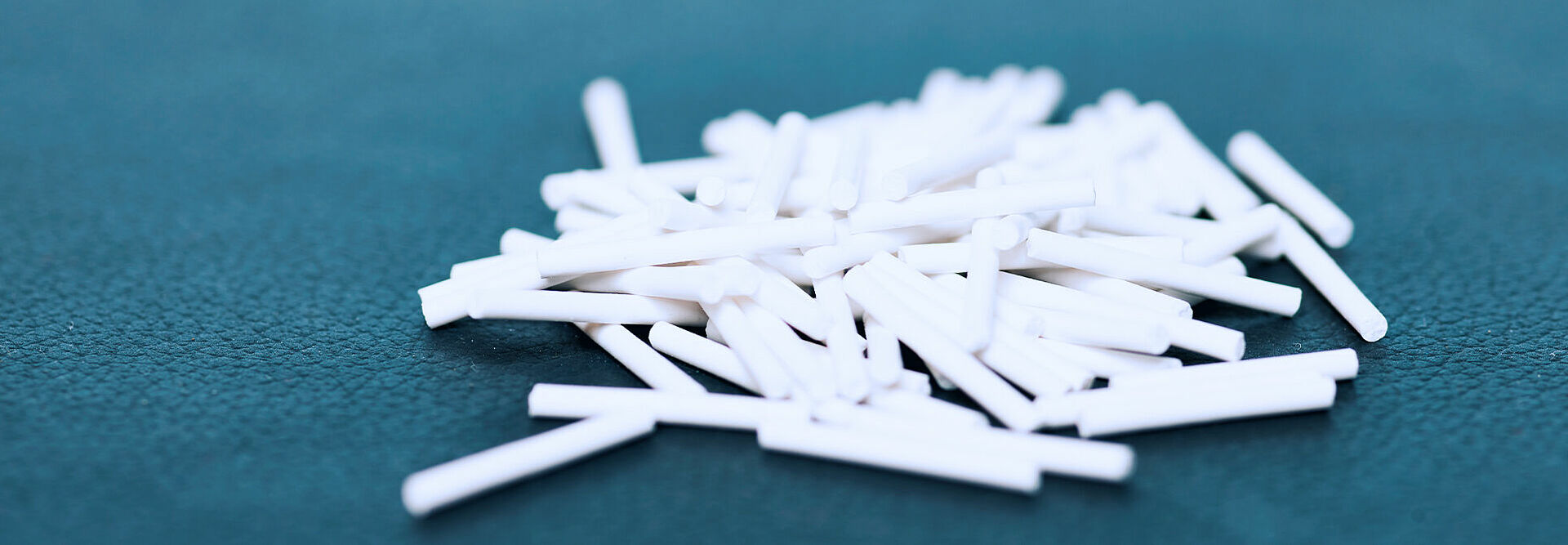Pelleting Plants for Chemical Products
In the chemical industry, powdery products such as detergents, cleaning agents, masterbatches or plastics are often processed. Pelleting of powders and fluids facilitates handling, improves dosing properties, reduces emissions, and optimises your processes. Machines and systems from AMANDUS KAHL ensure a high-quality solution in the chemical industry and are already used in more than 25 countries around the world.
Pellet mills for the chemical industry
Powdery chemicals are often difficult to process. This is due to high dust emissions, poor flow properties or rapid segregation. In addition, the requirements for storage and transport are very challenging. For these reasons, compacting or agglomeration of powders with AMANDUS KAHL pellet mills is the ideal solution. Pelleting of plastics and similar materials improves handling, processing, dosing, storage and transport in your production plant.
Our pellet mills differ, among other things, in the die diameter and the number of rollers in order to meet special requirements. The pellet mill 33 - 390, for example, has been used successfully in the chemical industry for more than 20 years.
Advantages of KAHL pelleting plants
Our granulation plants and pelleting plants for the chemical industry offer a wide range of advantages:
- Good dosability of powdery products
- Refinement of finished products
- Easy handling of our pelleting plants for chemical products
- Reduction of the dust load
- Improved flow properties and usability of your chemical products
- Reduction of the storage volume due to increased bulk density
- No segregation
- Optimum homogenisation by the KAHL pellet mills
- Higher economic efficiency of production processes
Flat die pellet mills for special requirements
For more than 40 years, AMANDUS KAHL has been building flat die pellet mills with which many powdery substances can be processed into low-dust pellets that can be easily dosed, stored and transported. In particular, the flat die pellet mills of the 33 series are ideally suited to meet the requirements of the chemical industry.
The combination of dies and pan grinder rollers specially adapted to the customer's process allows pellets with a diameter of 0.8 - 20 mm to be produced. The pellet quality can be adjusted by the design of the die according to the customer's requirements, so that not only diameter and length can be varied, but also bulk density, strength and surface structure.
We have compiled further information on this topic, our product range and specific areas of application under Flat die pellet mills for the chemical industry.
Optimum operation with KAHL pellet mills
We offer a further advantage with our electronic automatic pellet mill regulation (EAPR). It ensures optimal press operation while saving on manpower requirements. Switch and control plants for all plant sizes are programmed by AMANDUS KAHL and installed in the respective hardware product. Our electronics engineers develop customised user software for a high level of operational safety.
FAQs on pelleting plants for chemical products
Does a pelleting plant offer the proper solution for my company?
Kahl pellet mills are the perfect solution for a wide range of applications and companies. Our presses can be used to increase the bulk density, to reduce the dust load, to improve the flow properties and to stabilise mixtures. They are also easy to operate, low-maintenance and low-noise, and the temperature build-up is low compared to other pelleting methods.
When does it make sense to use a pelleting plant for chemical products?
Kahl pellet mills are suitable for a very wide range of products. Our pellet mills can be used to pellet powdery, lumpy or granular products, such as plastic additives, detergents, coal, graphite, masterbatches or various plastics such as PP, PET, PE, etc.
How much does a plant for chemical products from KAHL cost?
This depends entirely on the product to be processed and the desired throughput.
How does a pelleting plant for chemical products work?
Kahl pellet mills function according to the pan grinder roller principle. Due to gravity, the material to be pelleted falls from the dosing device into the vertically designed pellet mill. On the customisable die, the product is rolled over by cylindrical pan grinder rollers and pressed through the holes of the die. The product leaves the die at the bottom side in the form of a strand which is cut off by knives to a length desired by the customer. A discharge device transports the pellets out of the pellet mill.

